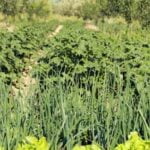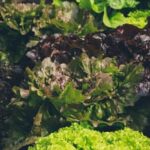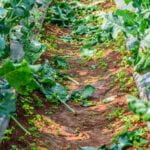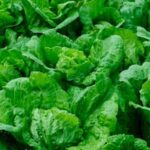Should you use mulch for vegetable gardens? Mulch serves a significant purpose in maintaining the health and vitality of your vegetable garden. It provides numerous benefits such as retaining moisture in the soil, preventing weed growth, and acting as a natural fertilizer.
Mulch, typically made from materials like straw, wood chips, or compost, plays a crucial role in regulating soil temperature and protecting it from erosion. Not only that, but it also adds essential nutrients to the soil and reduces the need for herbicides. Understanding the different types of mulch available and how to use it effectively is essential for any vegetable gardener.
In this article, we will explore the various types of mulch suitable for vegetable gardens and discuss their pros and cons. We will delve into the impact of mulch on soil health and its ability to control weed growth. Additionally, we will provide best practices for using mulch in vegetable gardens and highlight common mistakes to avoid. Whether you are a beginner or experienced gardener, understanding how to use mulch effectively can significantly improve the success of your vegetable garden.
Types of Mulch for Vegetable Gardens
Straw
is a popular choice for vegetable gardens as it is readily available, affordable, and helps to retain moisture in the soil. However, straw may contain weed seeds that can sprout in your garden. It also breaks down relatively quickly, meaning you will need to replenish it frequently.
Wood Chips
are another common option for mulching vegetable gardens. They have a longer lifespan compared to straw and can help regulate soil temperature effectively. However, wood chips may deplete nitrogen from the soil as they decompose, so it’s important to monitor the nutrient levels in your garden when using this type of mulch.
Compost
can be an excellent choice for vegetable gardens as it not only helps retain moisture and regulate soil temperature but also adds nutrients to the soil as it breaks down. Additionally, using compost as mulch reduces waste by recycling organic materials from your kitchen and garden. However, if the compost is not fully decomposed before application, it could compete with plants for nitrogen during the decomposition process.
Each type of mulch has its own benefits and drawbacks, so it’s important to consider your specific gardening needs before deciding which mulch is best for your vegetable garden. Additionally, combining different types of mulch can provide a more balanced approach to reaping the benefits while minimizing any potential drawbacks.
The Role of Mulch in Soil Health
Mulch plays a crucial role in maintaining the health of the soil in vegetable gardens. It acts as a protective barrier, retaining moisture and regulating soil temperature, which are vital for the growth of vegetables. Here are some key ways in which mulch contributes to soil health:
1. Retaining Moisture: Mulch helps the soil retain moisture by preventing evaporation. This is especially important during hot and dry weather conditions when the soil can quickly lose water. By keeping the soil consistently moist, mulch creates an ideal environment for vegetable plants to thrive.
2. Regulating Soil Temperature: Another benefit of using mulch in vegetable gardens is its ability to regulate soil temperature. In hot weather, mulch provides insulation, keeping the soil cool and preventing it from getting too warm. In colder temperatures, mulch acts as a protective layer, keeping the soil warmer and reducing the risk of frost damage to plants.
3. Improving Soil Structure: Over time, organic mulches such as compost or straw break down and contribute to improving the structure of the soil. As these materials decompose, they add valuable organic matter to the soil, enhancing its fertility and overall health.
Weed Control With Mulch
When it comes to maintaining a thriving vegetable garden, weed control is one of the key challenges for many gardeners. However, using mulch in your vegetable garden can be an effective and natural way to prevent weed growth. There are several ways in which mulch can contribute to controlling weeds in your garden:
- Smothering Effect: One of the primary ways that mulch helps control weeds is by smothering them and preventing their growth. The presence of mulch blocks out sunlight and prevents weed seeds from germinating and growing.
- Reduced Competition: Mulch helps reduce competition for water, nutrients, and space between vegetable plants and weeds. This makes it easier for your vegetables to thrive without having to compete with pesky weeds.
- Preventing Seed Dispersal: Mulch also serves as a barrier that prevents new weed seeds from making contact with the soil, thus inhibiting their ability to take root and grow in your garden.
In addition to these benefits, using mulch for weed control in your vegetable garden can also minimize the need for herbicides, which is not only better for the environment but also reduces potential chemical exposure on your crops.
Lastly, it’s important to choose the right type of mulch for effective weed control. While some materials like straw or wood chips work well at suppressing weeds, others such as grass clippings may actually contribute to weed growth if they contain viable seeds. By selecting the appropriate mulch material and applying it correctly, you can significantly reduce the time and effort spent on weeding while promoting a healthier garden environment overall.
Preventing Soil Erosion
Protecting the Soil
One of the key benefits of using mulch in vegetable gardens is its role in preventing soil erosion. Mulch acts as a protective layer over the soil, shielding it from the impact of heavy rain and strong winds. This is particularly important for vegetable gardens, where delicate root systems can be easily damaged by erosion. By using mulch, gardeners can ensure that their soil remains intact and nutrient-rich, supporting healthy plant growth.
Importance for Vegetable Gardens
In vegetable gardens, preventing soil erosion is vital for maintaining the health and productivity of the crops. Erosion not only strips away valuable topsoil but also exposes plant roots to potential damage. This can lead to stunted growth and poor crop yield. By using mulch as a protective barrier, gardeners can safeguard their soil against erosion, creating a stable environment for their vegetables to thrive.
Choosing the Right Mulch for Erosion Control
Certain types of mulch are more effective at preventing soil erosion than others. Organic options such as straw or compost provide excellent coverage and help bind the soil together, reducing the risk of erosion.
Additionally, fine-textured mulches like shredded leaves or pine needles create a dense layer that offers enhanced protection against erosion. When selecting mulch for a vegetable garden with a focus on erosion control, it’s essential to choose a type that will effectively anchor the soil and withstand environmental elements.
Mulch as a Nutrient Source
One of the lesser-known benefits of using mulch in vegetable gardens is its role as a nutrient source for the soil. Mulch can be made from various organic materials such as straw, leaves, grass clippings, and compost, all of which break down over time and release valuable nutrients into the soil. As these organic materials decompose, they provide essential nutrients like nitrogen, phosphorus, and potassium to the plants.
In addition to providing nutrients to the soil, mulch also improves its structure, making it easier for plant roots to access these essential elements. This means that not only does mulch act as a source of nutrients itself, but it also enhances the overall nutrient uptake by the vegetable plants in the garden. As a result, using mulch can lead to healthier and more productive crops.
To maximize the nutrient-providing benefits of mulch in a vegetable garden, it’s important to choose the right type of mulch and apply it correctly. For example, certain types of mulch like wood chips take longer to decompose compared to grass clippings or compost. Understanding this decomposition process can help gardeners select an appropriate type of mulch that aligns with their specific gardening needs.
| Organic Material | Nutrients Released |
|---|---|
| Straw | Nitrogen, Potassium |
| Leaves | Carbon, Trace Minerals |
| Grass Clippings | Nitrogen, Phosphorus |
| Compost | All Essential Nutrients in Balanced Amounts |
Best Practices for Using Mulch in Vegetable Gardens
Mulch is a highly beneficial addition to any vegetable garden, offering a wide range of advantages that can contribute to the overall health and productivity of the plants. However, in order to make the most of these benefits, it’s important to follow best practices for using mulch in vegetable gardens.
One key aspect of using mulch effectively in a vegetable garden is proper application. It’s essential to apply the right amount of mulch – too little may not provide sufficient benefits, while too much could lead to issues such as waterlogging or mold growth. As a general rule, aim for a layer of mulch around 2-4 inches thick to achieve the best results.
In addition to correct application, maintaining and replenishing the mulch in the garden is also crucial. Over time, organic mulches such as straw or compost will break down and decompose, so it’s important to regularly top up the mulch layer to ensure that it continues to provide the desired benefits. This could involve adding fresh material every few months or as needed throughout the growing season.
Another important practice when using mulch in vegetable gardens is choosing the right type of mulch for your specific plants and growing conditions. Consider factors such as moisture retention, temperature regulation, and nutrient content when selecting a type of mulch. Conducting some research on different options available – such as straw, wood chips, or compost – can help you make an informed decision based on the needs of your vegetable garden.
Common Mistakes to Avoid
In conclusion, using mulch in vegetable gardens can offer a wide range of benefits for soil health, weed control, and preventing soil erosion. However, there are some common mistakes to avoid when utilizing mulch in your garden. One of the most important things to keep in mind is to choose the right type of mulch for your specific vegetables and garden conditions.
For example, while wood chips may be suitable for some plants, they may not be the best option for others. It’s essential to research and understand the needs of your plants before selecting a mulch type.
Another mistake to avoid is applying too much or too little mulch. Over-mulching can lead to problems such as mold growth or pest infestations, while under-mulching may not provide sufficient benefits such as moisture retention or weed control. Proper application and maintenance of mulch are crucial for reaping its advantages without encountering any potential issues.
Lastly, it’s important to avoid using contaminated or poor-quality mulch in your vegetable garden. Low-quality mulch may introduce harmful substances into the soil or contribute to nutrient imbalances, ultimately impacting the health of your plants. By being mindful of these common mistakes and following best practices for using mulch in vegetable gardens, you can enhance the overall productivity and health of your crops while minimizing potential drawbacks.
Frequently Asked Questions
Should I Put Mulch in My Vegetable Garden?
Mulch should definitely be used in a vegetable garden for several reasons. It helps to retain soil moisture, suppresses weed growth, and adds organic matter to the soil as it breaks down. These benefits ultimately contribute to healthier and more productive vegetable plants.
Should I Put Mulch Around My Tomato Plants?
Yes, mulch is beneficial when placed around tomato plants. Mulch helps to regulate soil temperature, conserve moisture, and reduce the development of certain plant diseases. When applying mulch around tomato plants, it’s important to do so carefully in order to avoid causing damage to the stems or contributing to excessive moisture levels that can lead to rot.
What Plants Should Not Be Mulched?
Certain plants should not be mulched, particularly those that are susceptible to excess moisture or fungal diseases. For example, plants like cacti and succulents do not benefit from mulching as it can cause root rot due to excessive water retention.
Additionally, some shallow-rooted herbs like rosemary or lavender may struggle if mulched too heavily, as it can create overly damp conditions that they dislike. In general, it’s best to research each specific plant’s needs before applying mulch around them.

If you’re looking to get into vegetable gardening, or are just looking for some tips on how to make your current garden better, then you’ve come to the right place! My name is Ethel and I have been gardening for years. In this blog, I’m going to share with you some of my best tips on how to create a successful vegetable garden.





